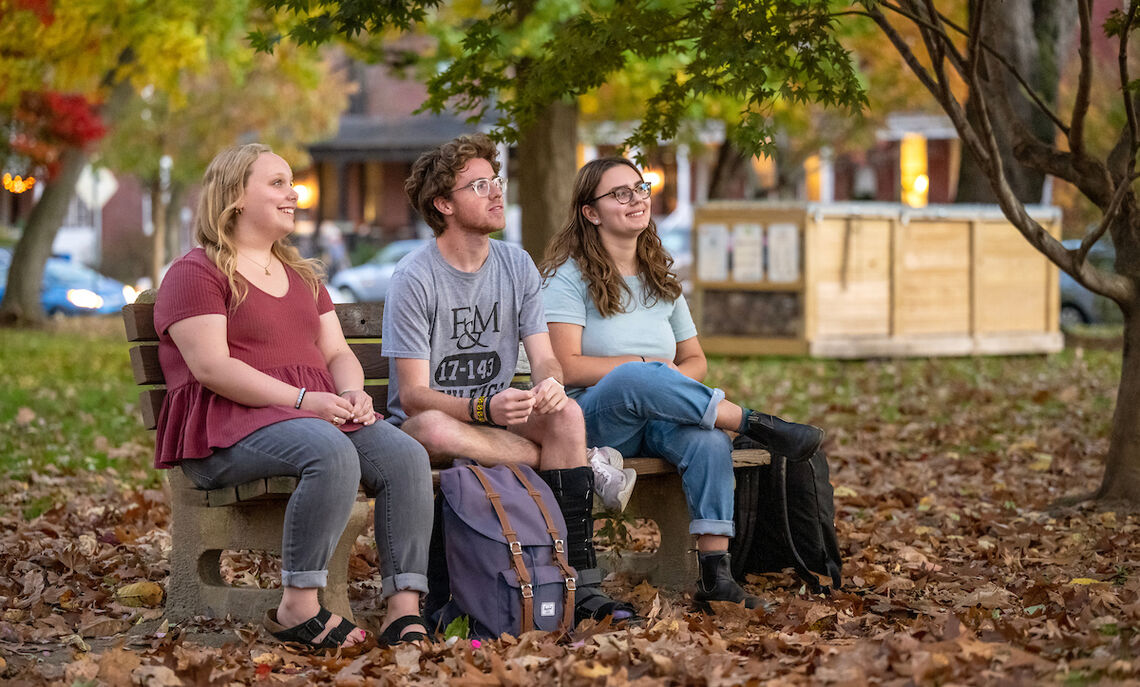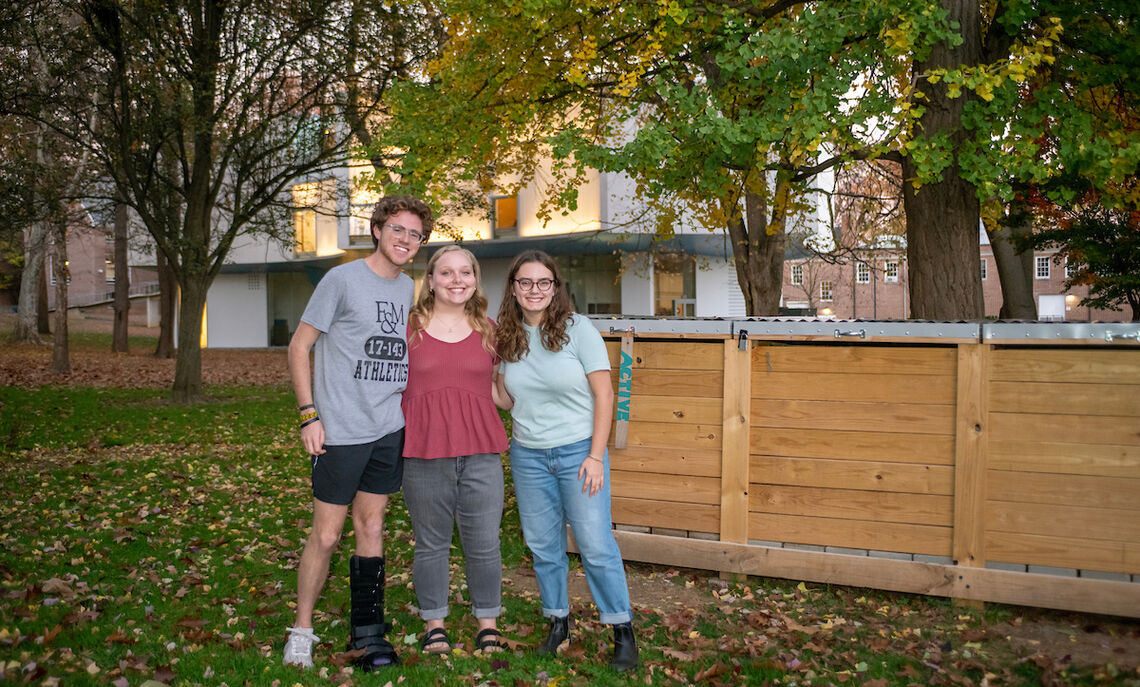F&M Stories
F&M Compost Co-Op Diverts Costs and CO2 in Lancaster
A Franklin & Marshall College compost initiative has evolved into a co-op saving the City of Lancaster $5,215 per year — all while diverting 16,638 pounds of food waste from the solid-waste stream each month.
The Lancaster Composting Co-Ops (LCC) are a volunteer-led, community initiative enabling Lancaster residents to reduce household food waste by creating high-quality compost. Associate Professor of Environmental Studies Eve Bratman piloted the program.
"F&M students have been involved since the outset in helping to inspire and push along the work," she said.
The idea sprouted in Bratman's senior seminar for environmental studies in spring 2018. She proposed a pilot initiative and received funding from F&M's Center for Sustained Engagement with Lancaster to develop the initial model.
Residents began composting in April 2021, with three bin locations in the city of Lancaster (Musser Park, Lancaster Recycling Drop-Off Center, and Culliton Park). Bins have since been added at Linear Park and Buchanan Park, adjacent to F&M.
The program has grown to 250 households. Membership in LCC is free and open to the public; members are required to attend a brief orientation session and participate in occasional compost maintenance workdays.
Prior to this, Lancaster residents had no alternatives beyond their own backyards to divert organic food and garden scraps from the general waste stream.
Three students spent their summer evaluating and co-authoring a white paper documenting the LCC's first year in terms of cost savings and social impact: Senior Bennett Wasch, junior Caroline Kleis and sophomore Athena Kotsopriftis.
"Having that quantitative and qualitative data has been really important for informing our efforts and for making the case," Bratman said.
Caroline Kleis '24, Bennett Wasch '23, and Athena Kotsopriftis '25
Caroline Kleis '24, Bennett Wasch '23, and Athena Kotsopriftis '25
Findings
Over 80% of Lancaster Compost Co-op members are Lancaster City residents. In total, 368 individuals' worth of food waste is delivered to LCC compost bins throughout the year.
On average, each individual household average drops off 35.33 lbs of food waste per month. This diverts approximately 16,638 pounds of food waste from the solid-waste stream each month. Annualized, that's nearly 200,000 pounds of food waste composted into beneficial soil (For context, that's roughly the same weight as 33 pickup trucks).
The program also alleviates roughly 39 tons of carbon dioxide equivalent monthly and 472 tons of that equivalent annually — equal to driving almost 100,000 miles every month.
Beyond the cost and carbon savings, the co-ops have expanded into microcommunities that share activities such as neighborhood work days and book clubs.
"Our report doesn't fully capture it, but what we're seeing is that it's not just about composting; it's about building community in all these other ways that are fostering social connections," Bratman said.
Lancaster Composting Co-Ops Fast Facts
- Project began April 2021
- 80% of members are Lancaster City residents
- 5 compost bin locations
- Monthly household average of 35.33 lbs of food waste (199,656 yearly)
- Alleviates 39.36 tons of CO2 equivalent monthly (472.32 yearly)
- 66.6% of members say reducing household waste is top priority
- 40% of members say city sustainability and cost-saving efforts is second priority
Caroline Kleis ’24
Hometown: Towson, Md.Majors: Environmental studies and public policy
Minor: Economics
How did you evaluate the LCC’s first year?
It was a first-year program evaluation that culminated in a white paper where we talked about member demographics and future possibilities for the program. We did a lot of survey data analysis and also interviewed members.
Athena Kotsopriftis ’25
Hometown: New York., N.Y.Major: Environmental studies
Minor: Economics
What surprised you about this research?
Something that surprised me – or more that I took away from it – was just the true impact and importance of volunteer-led, decentralized initiatives. While interviewing people, you could really see their dedication to being a part of Lancaster Composting cooperatives. Even in some of my classes now – when we talk about governments, for instance – I see how volunteer-led initiatives can actually promote a lot of change.
Bennett Wasch ’23
Hometown: Annapolis, Md.Majors: Environmental studies and government
Minor: Science, technology and society
What do you hope for the future of this program?
I'm hoping that it's used as a model for other cities. Some of the research that we were doing was looking at this as a model. I would love to see it actually being used as a model for other cities that are similarly sized and for people that want to be involved but don’t want to pay for it, or aren’t able to. I think it opens doors for people.
Related Articles
February 16, 2026
Powering Innovation: Inside F&M’s Campus Supercomputer
Imagine 1,600 computer processors combining power toward one task. This is the engine driving innovation at F&M. Called a High-Performance Computing (HPC) cluster, this elite shared resource accelerates discovery, empowers large-scale research, and fuels the collaborative spirit that defines the F&M experience.
February 3, 2026
Coral, Caves and Ice Cores: The Path to Hydrology for Monica Arienzo ’08
Hydrology research has taken Monica Arienzo ’08 to coral reefs in the U.S. Virgin Islands, underwater caves in the Bahamas and ice cores in Antarctica and Greenland.
January 28, 2026
A Landmark Investment in Geosciences: Honoring Professor Robert C. Walter
A transformative $2.1 million gift from an anonymous donor celebrates Franklin & Marshall’s renowned Department of Earth & Environment and the impact of its esteemed faculty. The gift establishes the Distinguished Professorship of Geosciences in honor of Robert C. Walter, Ph.D. ’75, and creates the Earth & Environment Instrument Support Endowment.


